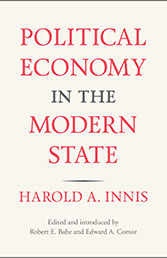FIMS News
Contact Information
FIMS Communications
Becky Blue
Email
519-661-2111x88493
FIMS & Nursing Building
Rm 2060C
Recent book publications from FIMS faculty members
Cyberwar and Revolution: Digital Subterfuge in Global Capitalism
 Authored by Nick Dyer-Witheford and Svitlana Matviyenko (Published March 2019)
Authored by Nick Dyer-Witheford and Svitlana Matviyenko (Published March 2019)
Description from publisher (University of Minnesota Press): Uncovering the class conflicts, geopolitical dynamics, and aggressive capitalism propelling the militarization of the internet
Cyberwar and Revolution argues that digital warfare is not a bug in the logic of global capitalism but rather a feature of its chaotic, disorderly unconscious. Urgently confronting the concept of cyberwar through the lens of both Marxist critical theory and psychoanalysis, Nick Dyer-Witheford and Svitlana Matviyenko provide a wide-ranging examination of the class conflicts and geopolitical dynamics propelling war across digital networks.
Engaging, imaginative, and thorough, Cyberwar and Revolution tracks the emergence of cyberwar as expressions and fantasies that reveal the unconscious violent hostility of contemporary capitalism.
— Benjamin Noys, author of Malign Velocities: Accelerationism and Capitalism
Political Economy in the Modern State
 Edited and introduced by Robert E. Babe and Edward A. Comor (Published November 2018)
Edited and introduced by Robert E. Babe and Edward A. Comor (Published November 2018)
Description from publisher (University of Toronto Press): Political Economy in the Modern State is Harold Innis’s transitional and, in some respects, his most transformative book. Completed in 1946, it is a collection of fifteen chapters plus a remarkable Preface selected and crafted to address four main themes: the problem of power and peace in the post-War era; the ascent of specialized and mechanized forms of knowledge involving, most particularly, the media, the state, and the academy; the crisis facing civilization and, more generally, the modern penchant for unreflexive short-term thinking in the face of mounting contradictions; and Innis’s growing focus on what would be called media bias.
In this new edition, editors Robert E. Babe and Edward A. Comor provide not only a general introduction to Innis’s largely forgotten book but also dedicated introductions to each of its fifteen chapters and a comprehensive index. Together, Babe and Comor demonstrate how Innis’s volume reflects a shift in Innis’s focus, away from analytical relativism towards, instead, a reflexive search for objective truths.


